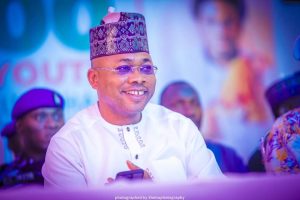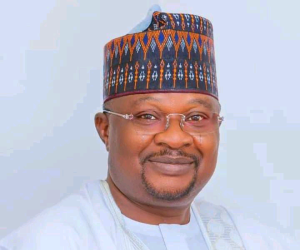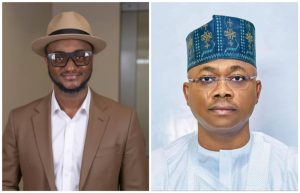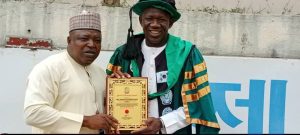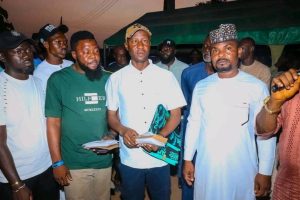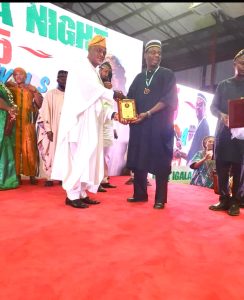2023 presidency: Yahaya Bello’s audacity of hope
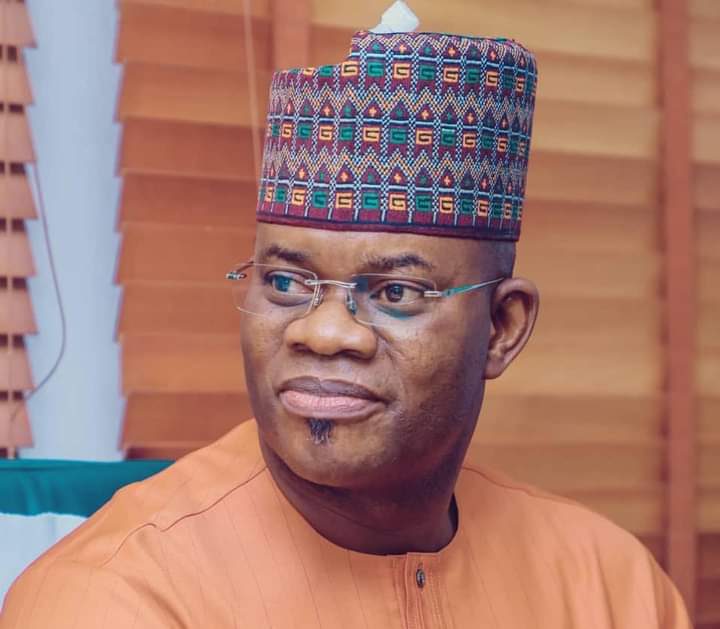
By Wilfred Eya
For those who understand the dynamics of politics in Nigeria, the signs of what to expect in the 2023 general election are all over the place. Despite the seeming collapse of the nation’s security architecture and pervading air of uncertainty in the land, Nigeria is no doubt already in the mood for the usually turbulent power game that characterizes her general elections in every four years.
As the days go by, power brokers and various influencers in the politics of the nation struggle to perfect their strategies for the imminent showdown.
But in the frenzy, the interests of most Nigerians are on who occupies the all-powerful presidential seat. Currently, the question is who succeeds President Muhammadu Buhari in 2023. Surprisingly, not many names are in the public domain even though the body languages of some people suggest that they have an interest in the presidential seat. Though the elections are still far away, aspirants to the presidential seat have started building alliances, reviving old political catchphrases like the perennial call for restructuring, power shift and the unending quest for ethno-religious consideration in power distribution.
They are recalling old sentiments that seem to resonate with the people during elections even as aspirants have started testing the waters by sending out their foot soldiers, shadowy groups and emissaries to start mobilising support for them across board.
However, one person whose presidential ambition is no more a subject of speculation is the Kogi State governor, Alhaji Yahaya Bello. He will be recorded in history as the first presidential aspirant of the 2023 general elections.
For critical observers, the 45 year old and youngest governor of the present dispensation may just have embarked on a political journey largely predicated on what the former president of the United States of America, Barack Obama, referred to as the audacity of hope. The declaration of his intention to contest for the seat of the president of the Federal Republic of Nigeria in 2023, is perceived by many as one of the most audacious moves by any politician in Nigeria since the return of the current democratic experiment in 1999.
Close watchers of political developments in Nigeria have expressed surprise that a young man of Bello’s age could muster the uncommon courage to contemplate daring the odds and hoping to achieve a paradigm shift in the politics of the country.
Bello was declared winner of the 2015 Kogi gubernatorial election after he was chosen on the platform of the All Progressives Congress (APC) as a replacement for the late Abubakar Audu who originally won the election but died before the result was declared. On November 16,
2019, Bello was again re-elected after he defeated the PDP opposition by over 200,000 votes. He is the only Nigerian governor to be born after the Nigerian Civil War, thus making him the youngest governor in the country.
No matter whatever impression anybody may have about Governor Bello, one thing that one may not take away from him is that he is a man of his own convictions. His antecedents so far have shown him as a man who goes after his goals with all the energy he can muster. When his 2023 presidential ambition filtered into the public space via his posters, Yahaya Bello was largely a butt of ridiculous jokes and sarcasm by some people particularly those of the country’s ubiquitous social media. But from all indications, what started as a rumour has taken a life of its own.
Recall that a youth group had given Gov Bello a seven-day ultimatum to make his presidential ambition public and following that, he boldly stepped out to declare his preparedness to contest for the 2023 presidential poll. He was emphatic that his ambition was predicated on calls by the Nigerian youth, women, and the less-privileged to step into the hotly contested seat.
Speaking during the declaration, the governor had said: “I don’t refer to this as my presidential ambition. It is the ambition of the youths, the younger generation, the women, the less-privileged, the deprived and the oppressed in the society.”
But some political analysts and public commentators see challenges in Bello’s move.
First, Bello is not from one of the three major ethnic nationalities in Nigeria. To them, it is usually difficult to dream of being a Nigerian President if you are not from one of the three major ethnic groups in the country – Hausa, Igbo or Yoruba. Many still think that Goodluck Jonathan’s case was circumstantial and by happenstance. The argument is that the sentiment is one of the major political storms that must be weathered by Bello if his dreams must come to reality.
Secondly, they consider it an uphill task for a 45-year-old Bello to think of becoming president in a country where the youth are considered incompetent and lacking the war chest to occupy such a position.
However, a segment of the country’s populace believes that what seems a disadvantage to Bello is even what would help his case when the election comes. For instance, there is a predominant disposition by the majority that Nigeria would need a man of the younger generation to succeed President Buhari whose critics insist that he relatively failed to deliver on his campaign promises because of age. So, to such people, Bello at 45 perfectly qualifies for the position. The advantage of age was recently boosted with the recent international press conference in London, United Kingdom, by the Bello Diaspora Support Movement, (BDSM) to draw the attention of Nigerians, home and abroad, to his presidential project.
BDSM said the Diaspora support movement was designed to actualise the youth presidential project as represented in Governor Bello.
Even his worst critics would agree that it was not for nothing that his party appointed him as the Chairman, APC Youths, Women and PLWDS Mobilisation Committee. Considering the prime position of the youth in any political party, that singular appointment shows the level of trust the APC has in him. And many would agree that since his assumption of that position, his leadership potential became more visible and he undoubtedly has become a major stakeholder in the ruling party. He is one of those who have contributed to the swelling ranks of the APC ahead of the next general elections.
Also, there are others who believe that the governor’s geopolitical zone could be another plus to his ambition. Gov Bello is from the North Central geopolitical zone, a region that has also not occupied the presidential seat since 1999 even as it has contributed so much to the stability of the Fourth Republic. His supporters believe that coming from the North Central is certainly one of the odds in his favour in the buildup to the election. However, the only snag is the controversy of power rotation between the North and South.
Besides, he is not a conventional or mainstream politician who believes that the office of the President is for the display of grandeur and not that of responsibility. In several of his public appearances, he has promised to change the culture if he becomes president. Before Bello, Kogi people around the world had always dreamt of having a governor or leader who would launch the state on the national and international stages; a unifier who would collapse the walls of division and a patriotic leader who places service above elections. Many of his supporters believe that in Alh Yahaya Bello, their prayers were answered, hence their support for his presidential ambition
Also, despite what his critics may hold against him, those who are familiar with developments in Kogi State in the last six years would agree that he has substantially fulfilled his campaign promises to the people of the Confluence state. His administration has constructed the biggest Rice Mill in Northern Nigeria, which is of 50 tons per day at Omi in Ejiba community, Yagba East Lcoal Government Area of Kogi State. The rice mill has introduced the “Confluence Rice,” making Kogi one of the states that producers rice in Nigeria.
Also in terms of road infrastructure, he has done well. Some of them include 10.7km, Agasa-Ukpogoro, 8.5km, Ogaminana/Ebogogo/Total junction through Eika Itakpe, 12.8km, Ebiya Kpatesi/Ogigiri, 21km, Obeira Okengwe/ Obange, rehabilitation of Idah/Ajaka/Umomi/ Ejule Road in Kogi East and rehabilitation of Kabba township Road, Kogi West, Kogi State
His supporters believe that Governor Yahaya Bello’s personal attributes as a leader have placed him above waters in handling the complexity of Kogi State, from his interpersonal relationship to his emotional intelligence, which have created a bridge to bind socio-economic deliverables in the state. For instance, as a detribalised leader, he picked his Chief of Staff from another ethnic group and religion, which never happened in the state before. That singular act in the eyes of many has collapsed the walls of ethnic rivalries and hate that characterised Kogi politics in the past. His rare tolerance for all religious and ethnic groups in Kogi State led him to do the following:
“Sixty three years embargo lifted on Igala Cultural festival, with funding for an Igala Movie; tremendous contribution to the building of the Igala Unity House, at Anyigba, Kogi East; and Project Power Kogi East (PPKE) which is the injection of funds in excess of N1.5bn to power over 100 communities in Kogi East which until now was 90 per cent in perpetual darkness.
Before the advent of the present administration, the state was sharply divided along ethnic lines, corroded by disunity as politicians planted division in the minds of the people for their selfish political gains. The first three appointments of the governor immediately after his inauguration on January 27, 2016, were spread across the three Senatorial Districts. Mr. Edward Onoja from Kogi East became his first CoS to emerge from a zone different from that of the governor. All the governors before him had ensured their CoS emerged from their zones. Governor Bello came and changed that. His SA Media was appointed from Kogi Central and his CPS from Kogi West. Many considered the appointments as a fresh breeze that reshaped the mentality of the Kogi People. Projects were also spread all over the state and the institutions of government were ushered into a new vista of development.
One of the areas the administration of Governor Bello has performed most beautifully also is in the area of security. From being one of the most insecure and dreaded states at the time he took over, the state has risen to become one of the safest in Nigeria today. In different fora, he made it clear that his administration’s determination and commitment toward securing the state was borne out of the conviction that security remains the primary and most important function of government. He also believes that security is the bedrock of growth and development in any society. It is little wonder that the National Bureau of Statistics named Kogi, Kebbi and Bauchi as the leading states with less reported crimes. The governor has also won awards on security from the Nigerian Police, CSOs, media and other reputable organisations.
Indeed, his supporters maintain that there is no sector where Governor Bello has not delivered democracy dividends to his people. Their argument is that having performed well in his capacity as governor, he would still do well in a higher capacity including as the president of Nigeria.

